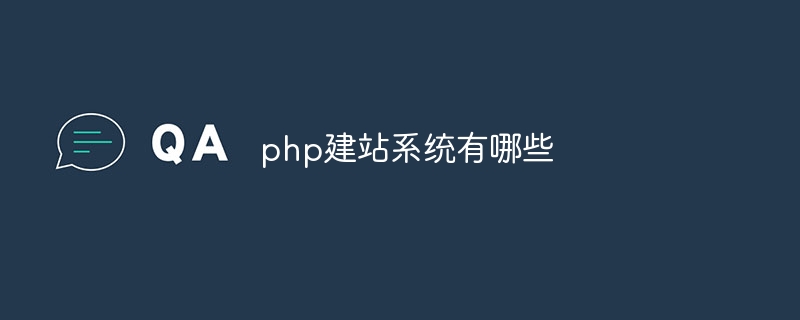Home >Backend Development >PHP Problem >What are the PHP website building systems?
What are the PHP website building systems?
- 小老鼠Original
- 2023-07-12 15:04:072471browse
php website building systems include: 1. WordPress, one of the most popular PHP website building systems; 2. Joomla, a popular PHP website building system; 3. Drupal, a very flexible and powerful PHP website building system; 4. Discuz!, a PHP website building system focusing on forum construction; 5. ThinkPHP, a well-known domestic PHP development framework, which can also be used as a rapid website building system.

The operating environment of this tutorial: Windows 10 system, PHP8.1.3 version, Dell G3 computer.
In today's Internet era, building a website has become a common need in all walks of life. As a widely used back-end development language, PHP has powerful dynamic web development capabilities, so it has been widely used in website building systems. This article will introduce some common PHP website building systems, as well as their characteristics and application scenarios.
1. WordPress:
WordPress is one of the most popular PHP website building systems currently. It is favored by the majority of users for its simplicity, ease of use and flexibility. WordPress has rich theme and plug-in resources, which can not only meet the needs of building personal blogs, but also support the construction of commercial websites. Due to its open source nature, WordPress can also be re-developed according to personal needs, and the degree of customization is very high.
2. Joomla:
Joomla is another popular PHP website building system. Compared with WordPress, Joomla is more suitable for building medium and large websites. Joomla provides many powerful features and extensions, such as multi-language support, user management, content management, etc., making it the first choice for enterprise portals or social networking websites. At the same time, Joomla also provides a wealth of templates and plug-in resources, which can quickly build a fully functional website.
3. Drupal:
Drupal is a very flexible and powerful PHP website building system that is widely used in the construction of enterprise-level websites. Drupal has rich module and theme resources, which can be flexibly customized and expanded according to different needs. At the same time, Drupal also attaches great importance to website security and performance optimization, providing powerful user permission control and caching mechanisms, making website management and access more efficient and secure.
4. Discuz!:
Discuz! is a PHP website building system focusing on forum construction, and it is also one of the most popular forum systems in China. Discuz! has good performance and powerful functions, including user management, section management, permission control, email system, etc., and is very suitable for building various types of forum communities. At the same time, Discuz! also provides a wealth of plug-in and template resources to meet the customization requirements of different forum needs.
5. ThinkPHP:
ThinkPHP is a well-known PHP development framework in China and can also be used as a rapid website building system. ThinkPHP provides a simple and easy-to-use development interface and rich development tools, which can quickly build a fully functional website. At the same time, ThinkPHP also provides flexible database operations and caching mechanisms, which can effectively improve website performance and user experience.
To sum up, the PHP website building system has rich choices and flexible customization capabilities, so it is a good choice when building a website. Whether it is a personal blog or a corporate portal, the PHP website building system can meet different needs and requirements. Choosing a suitable website building system can help users quickly build a fully functional, safe and efficient website.
The above is the detailed content of What are the PHP website building systems?. For more information, please follow other related articles on the PHP Chinese website!

